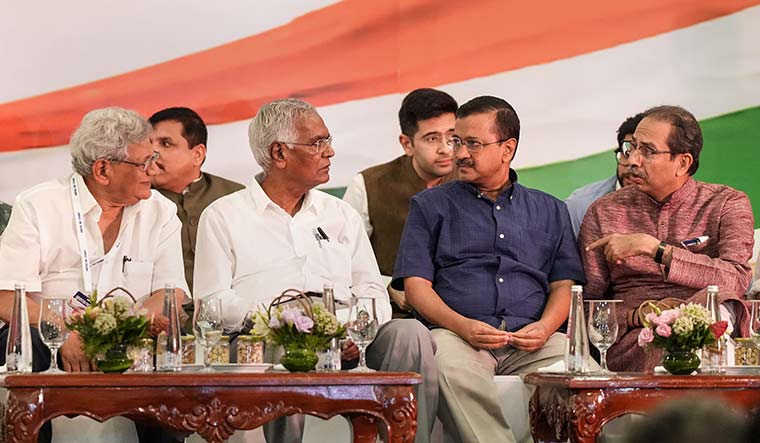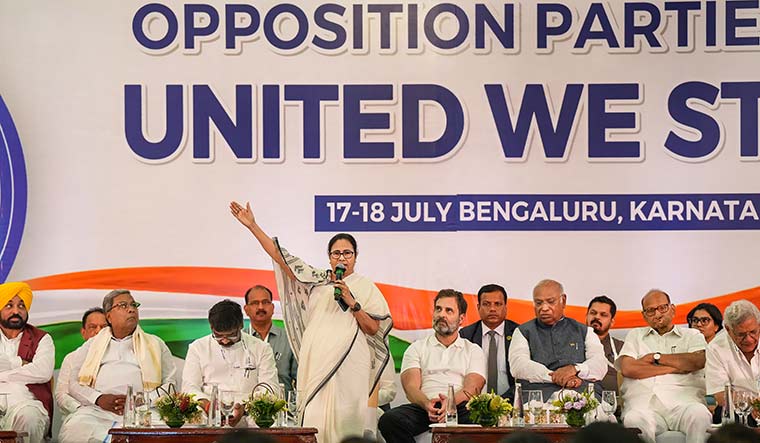INDIA, THE NEW name for the opposition alliance, has got widespread coverage on the news already. But, the inside story of how the leaders of 26 opposition parties who gathered in Bengaluru for a two-day meeting arrived at the name Indian National Developmental Inclusive Alliance is a study in the dynamics of the varied outfits and the efforts underway to get over their differences, or, at least get the optics right.
It is learnt that the name was originally the idea of former Congress president Rahul Gandhi. According to sources, on the evening of July 17, at the dinner hosted by Karnataka Chief Minister Siddaramaiah for opposition leaders attending the conclave, Rahul told a senior party leader that he was keen on the name INDIA, but he wanted West Bengal chief minister and Trinamool Congress supremo Mamata Banerjee to suggest the name at the meeting the next day.
For Rahul to route the name through Mamata was an extremely interesting decision. The Congress state unit is up in arms agains the Trinamool in West Bengal, especially with regard to the violence that took place during the recent panchayat elections. Mamata and Rahul have not had a particularly cordial relationship in the past. However, during the opposition meeting in Patna, Mamata helped calm down matters when the Congress and the Aam Aadmi Party got into an altercation over the Centre’s ordinance on Delhi’s bureaucracy. This gesture was appreciated by Rahul. Mamata suggesting the name was also perhaps intended to convey the impression that the leaders were keen to rise over differences.
Mamata was not present at the dinner, so the name was conveyed to her through a party colleague. She liked the name, but was keen on replacing ‘National’ with some other word starting with N. The Congress is learnt to have disagreed with that suggestion.
At the meeting, after Congress President Mallikarjun Kharge’s opening remarks, Mamata suggested the name INDIA for the alliance, and the floor was thrown open for discussion. Bihar Chief Minister Nitish Kumar was not completely convinced about the appropriateness of the name. Sources said he was of the view that it was not an apt name for a political alliance. Nitish is learnt to have suggested the name Indian Main Front.
 Wide spectrum alliance: (From left) Sitaram Yechury, D. Raja, Arvind Kejriwal and Uddhav Thackeray | PTI
Wide spectrum alliance: (From left) Sitaram Yechury, D. Raja, Arvind Kejriwal and Uddhav Thackeray | PTI
The left leaders then pitched in, saying they too had a name in mind. While they said INDIA was alright, it would be better if it was called We for India or V for India. The other parties disagreed, saying it sounded more like a slogan than the name of a group of political parties.
At this juncture, Peoples Democratic Party president Mehbooba Mufti gladdened the hearts of the Congress leaders in the meeting with her suggestion. As per sources, she said that since the Bharat Jodo Yatra was a huge success, the alliance could be called Bharat Jodo Alliance. On expected lines, the other parties did not agree.
National Conference leader Omar Abdullah is learnt to have told the gathering that the name should ring Indian.
Delhi Chief Minister Arvind Kejriwal, according to sources, said the name of the alliance was not such a big issue. He said the main issue is that of seat sharing and suggested that the talks for seat sharing should begin at the earliest.
At this, Jharkhand Chief Minister Hemant Soren is learnt to have said that if the name is not so important, why can’t the alliance simply be called United Progressive Alliance-3. This suggestion, however, did not find favour with the other leaders.
Nationalist Congress Party president Sharad Pawar conveyed another opposition leader’s suggestion for a name to former Congress president Sonia Gandhi. Sonia, who in all probability was aware of Rahul’s idea, said she would prefer to let the other leaders decide.
Ultimately, Rahul spoke on the issue and supported the name INDIA. He said it was a great idea which Mamata had suggested. He said it was apt since it carried in it the essence of the purpose for which the opposition parties were coming together. He said that if the fight was to safeguard the idea of India, the name conveyed it adequately. He also said he was confident that it would lend itself well to slogans such as ‘INDIA vs NDA’. In the end, everyone came on board and accepted the name INDIA.
The bonhomie between Rahul and Mamata continued into the press briefing. Mamata was effusive in her praise of Rahul, and referred to him as “our favourite Rahul Gandhi ji”. She said the campaign of the parties will be under the banner of INDIA, and even coined a slogan on the spot, declaring, “INDIA jeetega, BJP harega (INDIA will win, BJP will lose)”.
“It is a positive name,” said Congress general secretary (organisation) K.C. Venugopal. “It reflects what India stands for, which is love and brotherhood as against the hatred and divisiveness of the BJP. The difference between us and the NDA is clear.”
The process of choosing the name reflected the keenness of the parties to come across as a united force despite the inherent differences among them.
The next meeting of the opposition parties will be held in Mumbai in around a month’s time, with the Maharashtra Vikas Aghadi hosting the conclave. The choice of Mumbai as the venue of the next meeting was in view of the recent developments in the state and meant to be seen as a response to the ruling dispensation’s act of engineering a split in the Shiv Sena and the NCP. Pawar is learnt to have been rather quiet in the meeting and not his usual self.
Another important takeaway was the tacit acceptance by the grouping of the Congress’s pivotal role in the alliance. Setting the stage for the meeting, Kharge, in his opening remarks is learnt to have said that the Congress was not interested in the post of prime minister. He reminded the leaders that he had said this at the birthday celebrations of Tamil Nadu Chief Minister M.K. Stalin, too. Sources close to Kharge said the comment was aimed at disarming the Congress’s critics and also making it easier for the regional parties not comfortable with the Congress to be a part of the alliance.
According to sources, Sonia’s role in the meeting was that of an ideal host who facilitated discussions without becoming an active participant herself. Hers was meant to be an overarching presence and she did not get into the nitty gritty of the decisions being taken.
While the parties have got the optics right with regard to the name for the alliance, the more contentious issues have been left to be dealt with later. It was agreed in principle that the alliance will have an 11-member coordination committee. A secretariat that will be tasked with campaign management will be set up in Delhi, with members drawn from all parties. The specifics will be discussed in the next meeting.
As regards the most challenging task of seat sharing, a general understanding among the parties is that it will be discussed state-wise and at the state level.
Communist Party of India (Marxist) general secretary Sitaram Yechury said that it was decided at the meeting that cooperation among the parties to unseat the BJP can work only at the state level. “The parties will now start discussions [at the state level] on what sort of electoral arrangements are possible to ensure the maximisation of the anti-BJP vote and the BJP not claiming advantage of the division of the opposition votes, like it did during the last 10 years,” he said.
Choosing a name was perhaps the easiest among the items on the agenda. The real challenge begins now.


